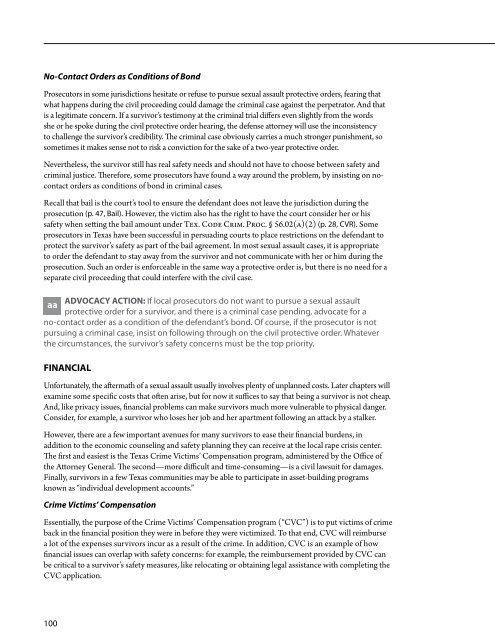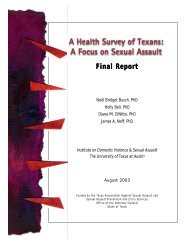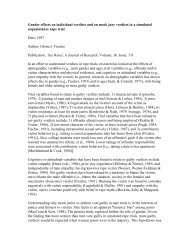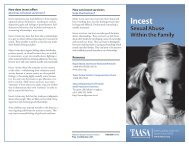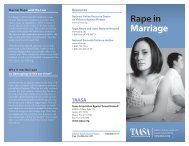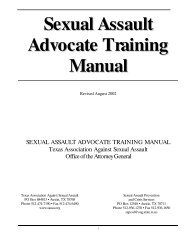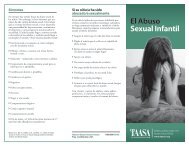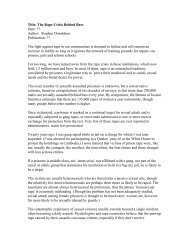Sexual aSSault LEGAL ADVOCACY MANUAL - Texas Association ...
Sexual aSSault LEGAL ADVOCACY MANUAL - Texas Association ...
Sexual aSSault LEGAL ADVOCACY MANUAL - Texas Association ...
You also want an ePaper? Increase the reach of your titles
YUMPU automatically turns print PDFs into web optimized ePapers that Google loves.
No-Contact Orders as Conditions of Bond<br />
Prosecutors in some jurisdictions hesitate or refuse to pursue sexual assault protective orders, fearing that<br />
what happens during the civil proceeding could damage the criminal case against the perpetrator. And that<br />
is a legitimate concern. If a survivor’s testimony at the criminal trial differs even slightly from the words<br />
she or he spoke during the civil protective order hearing, the defense attorney will use the inconsistency<br />
to challenge the survivor’s credibility. The criminal case obviously carries a much stronger punishment, so<br />
sometimes it makes sense not to risk a conviction for the sake of a two-year protective order.<br />
Nevertheless, the survivor still has real safety needs and should not have to choose between safety and<br />
criminal justice. Therefore, some prosecutors have found a way around the problem, by insisting on nocontact<br />
orders as conditions of bond in criminal cases.<br />
Recall that bail is the court’s tool to ensure the defendant does not leave the jurisdiction during the<br />
prosecution (p. 47, Bail). However, the victim also has the right to have the court consider her or his<br />
safety when setting the bail amount under Tex. Code Crim. Proc. § 56.02(a)(2) (p. 28, CVR). Some<br />
prosecutors in <strong>Texas</strong> have been successful in persuading courts to place restrictions on the defendant to<br />
protect the survivor’s safety as part of the bail agreement. In most sexual assault cases, it is appropriate<br />
to order the defendant to stay away from the survivor and not communicate with her or him during the<br />
prosecution. Such an order is enforceable in the same way a protective order is, but there is no need for a<br />
separate civil proceeding that could interfere with the civil case.<br />
<strong>ADVOCACY</strong> ACTION: If local prosecutors do not want to pursue a sexual assault<br />
protective order for a survivor, and there is a criminal case pending, advocate for a<br />
no-contact order as a condition of the defendant’s bond. Of course, if the prosecutor is not<br />
pursuing a criminal case, insist on following through on the civil protective order. Whatever<br />
the circumstances, the survivor’s safety concerns must be the top priority.<br />
Financial<br />
Unfortunately, the aftermath of a sexual assault usually involves plenty of unplanned costs. Later chapters will<br />
examine some specific costs that often arise, but for now it suffices to say that being a survivor is not cheap.<br />
And, like privacy issues, financial problems can make survivors much more vulnerable to physical danger.<br />
Consider, for example, a survivor who loses her job and her apartment following an attack by a stalker.<br />
However, there are a few important avenues for many survivors to ease their financial burdens, in<br />
addition to the economic counseling and safety planning they can receive at the local rape crisis center.<br />
The first and easiest is the <strong>Texas</strong> Crime Victims’ Compensation program, administered by the Office of<br />
the Attorney General. The second—more difficult and time-consuming—is a civil lawsuit for damages.<br />
Finally, survivors in a few <strong>Texas</strong> communities may be able to participate in asset-building programs<br />
known as “individual development accounts.”<br />
Crime Victims’ Compensation<br />
Essentially, the purpose of the Crime Victims’ Compensation program (“CVC”) is to put victims of crime<br />
back in the financial position they were in before they were victimized. To that end, CVC will reimburse<br />
a lot of the expenses survivors incur as a result of the crime. In addition, CVC is an example of how<br />
financial issues can overlap with safety concerns: for example, the reimbursement provided by CVC can<br />
be critical to a survivor’s safety measures, like relocating or obtaining legal assistance with completing the<br />
CVC application.<br />
100


